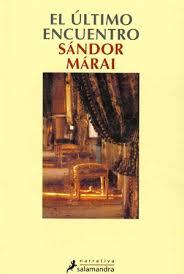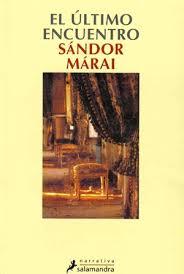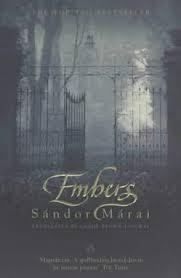
A veces, en medio de la selva, me acordaba del olor a moho del zaguán de la casa de Hietzing. En Viena, la música y todo lo que yo amaba, en sus piedras, en las miradas y en los modales de sus gentes, todo aquello se vivía como una pasión purificada por el corazón humano. Ya sabes, como cuando las pasiones ya no duelen.
Con este libro y este autor me ha ocurrido eso que a veces nos pasa: sentir que podíamos haber llegado antes.
Sándor Márai nació en Hungría en 1900 y murió en San Diego en 1989. Y hasta hace un par de meses no había leído nada escrito por su pluma. Quizá exagero, pero me da la sensación de que sus palabras, sino necesarias, sí habrían sido una excelente compañía en muchos momentos de la vida. Bueno, al menos, ahora ya está descubierto (gracias a una amiga a la que nunca se lo agradeceré lo suficiente), y no dejaré escapar la oportunidad de ahondar más en su obra.El Último Encuentro nos presenta la última cena de dos ancianos a los que la amistad unió durante gran parte de su vida. Sin embargo, llevan cuarenta años sin verse. Y tienen mucho que contar. En realidad, esta obra es un monólogo en que uno de los ancianos demanda respuestas, mientras hace una profunda reflexión sobre la vida, la amistad, el amor, la vejez. El amigo escucha y entre ambos, una mujer que ya no está físicamente, pero que nunca dejará de estar en la mente y el corazón de ambos hombres. A pesar de la estructura, ese monólogo extenso, la tensión va poco a poco aumentando, a veces haciéndose insoportable. El autor deja que el lector piense, imagine, no da verdades absolutas, sino pinceladas de lo que pudo haber sido. Me ha costado escribir esta entrada porque la obra de Sándor Márai me dejó sin palabras.
Sometimes, in the middle of the jungle, I remembered the smell of mould in the hall of the Hietzing's house. In Viena, the music and all I loved, on its stones, in the looks and manners of people, everything that was lived as a passion purified by the human heart. You know, as when passions no longer hurt.
This author and his book made me feel the odd frequent feeling of having arrived too late. Sándor Márai was born in Hungry in 1900, and he died in San Diego in 1989. But I discovered him just a couple of months ago. I might be making too much of it, but I think that his words, if not vital, would have been a great company in certain moments of my life. Well, the discovery is done (thanks to a friend I would never show enough gratitude for it) and will never let the opportunity to deepen in his work go.
Embers is about the last dinner of two elderly men tied by an special friendship, but who have not met in forty years. And obviously they have a lot to tell. But this work is not a dialogue but a monologue of one of them. He demands answers to an important question and meanwhile he talks about life, friendship, love and dead. His friend just listens and between both, there is a woman who has died but never leave their hearts.
Despite its structure, an extensive monologue, tension increases and becomes even unbereable. The author does not give us all the answers but allows us to think, imagine, without having total truths, just touches of what could have happened.
It's been hard to write this post because Sándor Marai's novel left me speechless.
EL ÚLTIMO ENCUENTRO, de SÁNDOR MÁRAI
EMBERS, by SÁNDOR MÁRAI

El esplendor de antaño ya no existe, todo anuncia el final de una época. Dos hombres mayores, que de jóvenes habían sido amigos inseparables, se citan a cenar tras cuarenta años sin verse. Uno ha pasado mucho tiempo en Extremo Oriente, el otro, en cambio, ha permanecido en su propiedad. Pero ambos han vivido a la espera de este momento, pues entre ellos se interpone un secreto de una fuerza singular. Todo converge en un duelo sin armas, aunque tal vez mucho más cruel, cuyo punto en común es el recuerdo imborrable de una mujer. La tensión aumenta, línea tras línea, hasta que se hace casi insoportable, pero la prosa continúa, implacable, precisa, fiel reflejo del empeño de los protagonistas por hurgar hasta en lo más recóndito de sus almas, allí donde se encuentran esas verdades cuyo descubrimiento provoca, al mismo tiempo, un insoslayable dolor y un incontenible impulso vital.

In a secluded woodland castle an old General prepares to receive a rare visitor, a man who was once his closest friend but who he has not seen in forty-one years. Over the ensuing hours host and guest will fight a duel of words and silences, accusations and evasions. They will exhume the memory of their friendship and that of the General’s beautiful, long-dead wife. And they will return to the time the three of them last sat together following a hunt in the nearby forest--a hunt in which no game was taken but during which something was lost forever.
